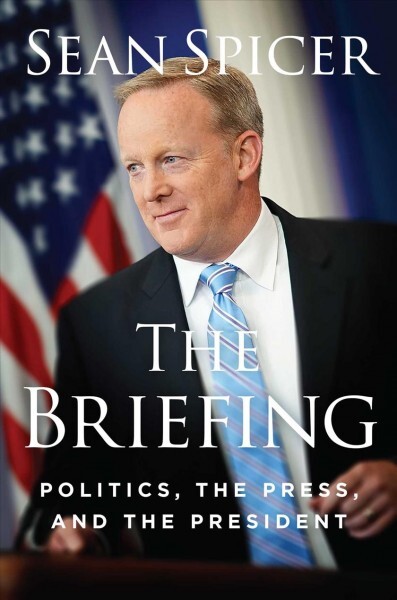The Briefing Politics the Press and the President Editorial Reviews

The Conference, a memoir by Sean Spicer, former press secretary for President Trump, hits shelves Tuesday. Eslah Attar/NPR hide caption
toggle caption
Eslah Attar/NPR

The Conference, a memoir by Sean Spicer, former press secretarial assistant for President Trump, hits shelves Tuesday.
Eslah Attar/NPR
Sean Spicer — testy, stumbling, and visibly unhappy — was not a very good press secretary. He seemed to dislike lying; the strain of it was axiomatic.
Sarah Sanders, with her unembarrassed and bullish ability to just proceed going, no matter how implausible the message, is much more convincing. Spicer only looked like the avatar of the Republican Party's moral crunch, sweating in a suit.
It was, he writes in The Briefing, his new memoir of his time in the Trump White business firm, "a lonely chore."
Then, why would you accept a role that forces y'all to either lie and be yelled at — or tell the truth and be yelled at?
The respond, I think, can be found in the furniture.
Sean Spicer is not a man of many adjectives, but when information technology comes to his descriptions of the West Wing in his volume, it feels like every table and chair gets a loving little encomium. And so there'due south Trump's airplane: "information technology was something else to see the famous Trump name in strong letters and imperial golden paint shining in the sun. I couldn't help simply notice each alphabetic character one by one." He moves to the inside of the airplane: "I found the interior of his jet to be tastefully appointed—loftier-back seats of cream-colored leather, polished panels of ruby woods with spotless brass accents."
For Spicer, the book leads the reader to believe, the press secretary seat was merely too adept: Spicer has a 18-carat awe for the function that seems to transcend even its holder. He praises Donald Trump, just writes that his own priorities are: "God, family, state, Navy, Republican Party, candidate."
At first, the tone of The Conference is jocular and daddish, like an annual Christmas letter of the alphabet ("Despite being five human foot half-dozen (and a half, but who's counting), I became the starting goalie on Portsmouth Abbey's soccer team.") But the tone curdles nearly a third of the fashion in, when he begins his familiar attacks on the media, which he considers overwhelmingly biased.
Many of his points are off-white. He intelligently dissects the reward structure of viral Twitter, and argues that journalists are incentivized to insert themselves into the story or get into public disputes with the White House in order to get airtime on CNN. And he is right to be frustrated by the journalists writing snidely almost his apparel or personal habits.

The Briefing
Politics, the Printing, and the President
Spicer gives a valuable sketch of what it looks like to move up through bourgeois Washington politics. And he as well works hard to own up to some of his own mistakes, including his nearly notorious corrigendum: his merits during a press briefing on Syrian President Bashar al-Assad that not even Hitler sunk to using chemical weapons on his own people. "To think that I had offended people — peculiarly those whose families had been victims of the Holocaust — twisted my tummy in a way I had never felt earlier and hope to never feel again," he writes.
But Spicer leaves out important context and doubles downwards on some of the lies he became famous for as printing secretary, including his cool claims near crowd size at Trump's inauguration.
Spicer's transparency on some points too makes his moral double standards more disappointing. For example, he denigrates Hillary Clinton for being married to Bill Clinton, who has been accused of sexual misconduct. "Many people had to inquire themselves: if what those women said is true, what kind of a woman would stand up by a man who did such things?" Probably the same kind of person who would stand by a president who bragged about sexually assaulting women. Or who would praise former congressman Mark Foley as "smart and ambitious...and fun to exist around" — without mentioning that he solicited nude photos and sex activity from teenage boys employed as congressional pages.
White House books of any political persuasion are usually disappointing. Not merely are they well-nigh politics (depressing), only they too make so little effort to exist books, with sentences someone might actually want to read and remember. Bland and self-important, they are often written by committee to achieve an finish: to promote someone for public office, forestall criticism, or facilitate a bout of the talk shows. The just people who read them with care are journalists and opposition researchers, who search them equally efficiently and joylessly as TSA agents looking for hints of explosive material.
The Conference has little in the way of explosives, merely it does take a punny plainness that makes me remember Spicer may not have used a ghostwriter or committee. Information technology does seem written to serve a specific purpose: Equally The New York Times recently reported, Spicer is looking to host his own talk show, in which he meets "some of the almost interesting and thoughtful public figures for a drink and some light conversation at a local pub or cafe."
Poor Sean Spicer. All he wants is some lite conversation. Guests, according to the proposal, "might fifty-fifty tangle over the merits of making your bed or the value of a great point guard."
Just Spicer has already fabricated his bed — it'south a shame he continues to prevarication in information technology.
Source: https://www.npr.org/2018/07/24/630594705/spicer-book-offers-insight-on-conservative-politics-doubles-down-on-misstatement
0 Response to "The Briefing Politics the Press and the President Editorial Reviews"
Post a Comment